|
Progressive
Men of Iowa
1899
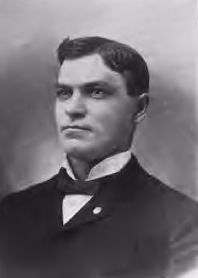 BLOODGOOD,
Freeman H., B. S., county superintendent of schools of
Fayette county, lives in West Union, and was born in
Linn county, Iowa, in 1867. He has the reputation of
being an active and progressive educational man who has
kept up with the times. He attended a graded rural
school in Linn county until he was 13 years old, when
his parents moved to Huron, S. D., and he went to school
there until 1885, working on a farm between times, thus
getting physical strength as well as mental culture. BLOODGOOD,
Freeman H., B. S., county superintendent of schools of
Fayette county, lives in West Union, and was born in
Linn county, Iowa, in 1867. He has the reputation of
being an active and progressive educational man who has
kept up with the times. He attended a graded rural
school in Linn county until he was 13 years old, when
his parents moved to Huron, S. D., and he went to school
there until 1885, working on a farm between times, thus
getting physical strength as well as mental culture.
In 1885 he entered Upper Iowa
University, from which he graduated in 1890 with a
creditable record.
He was a member of the Zethegathian Literary
society, and gained a high reputation for oratory. He
represented the college in the state contest in 1890.
Immediately upon his graduation he was elected to the
principalship of the Fayette public schools, which he
filled satisfactorily for two years, and then resigned
to enter Harvard university for post graduate work. He
returned to Fayette in the fall of 1893, and was elected
county superintendent as a republican.
December 19, 1893, Mr.
Bloodgood was married to Miss Ethel Hulbert, a charming
and accomplished lady, one of his classmates in college
and a resident of Fayette. They have since lived in West
Union. Mr. Bloodgood is now serving his third term as
county superintendent. He believes in
encouraging teachers to cherish the ambition to be
professional educators instead of making teaching a mere
makeshift. The schools of Fayette county have been given
a close supervision and have been much improved by this
energetic young man. He has demonstrated the result of
his work at the State Teachers' association in Des
Moines, where Fayette county for three consecutive
years, beginning in 1895, won a prize for the greatest
number of miles traveled by teachers in attending the
association.
In December, 1898, he was chosen president of the
Iowa State Teachers' association at Des Moines, and has
unanimously been chosen as city superintendent of the
Vinton schools for the year beginning September,
1899.
He is universally recognized among
educational workers as a man of ideas, who has something
to say and knows how to say it. He takes a leading part
in the several educational associations to which he
belongs, and was elected president of the Northeastern
Teachers' association in 1895, and president of the Iowa
County Superintendents' association in Des Moines in
1897.
Oratorical ability and the genius for teaching
combined cause him to be in general demand as a lecturer
and institute instructor. In these capacities Mr.
Bloodgood has been employed in various counties in the
state, and also in cities outside the state. His success
in educational work and the other qualities which make a
popular man have often suggested the fact that he is
available for the office of state superintendent of
public instruction.
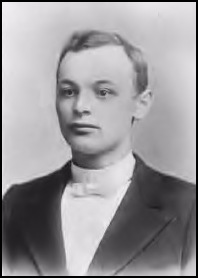 DICKMAN, John William, professor of German
and pedagogy in Upper Iowa university at Fayette, is one
of the rising young educators of Iowa. He was born in a
log house, live miles north of Defiance, Ohio, April 22,
1863, and was brought up on a farm. His father, William
Dickman, was born in Ohio also, where he learned the
cooper's trade. In 1857 he came to West Union, Iowa, but
after remaining five years returned to Ohio, and was
married in 1862 to Martha Ann Schott, a native of
Germany, who came to America when 3 years of age. Coming
to Iowa again in 1865, Mr. Dickman became a farmer, and
was very prosperous. He now owns a farm of about 600
acres, in Fayette county, and is worth from $40,000 to
$50,000. DICKMAN, John William, professor of German
and pedagogy in Upper Iowa university at Fayette, is one
of the rising young educators of Iowa. He was born in a
log house, live miles north of Defiance, Ohio, April 22,
1863, and was brought up on a farm. His father, William
Dickman, was born in Ohio also, where he learned the
cooper's trade. In 1857 he came to West Union, Iowa, but
after remaining five years returned to Ohio, and was
married in 1862 to Martha Ann Schott, a native of
Germany, who came to America when 3 years of age. Coming
to Iowa again in 1865, Mr. Dickman became a farmer, and
was very prosperous. He now owns a farm of about 600
acres, in Fayette county, and is worth from $40,000 to
$50,000.
J. W. Dickman began attending
district school when he was 8 years old, but was never
able to go more than about four months each winter, for
his services were always in demand on the farm. But he
im-proved his time, and did not leave the country school
until he was 18 years old, when he entered the
preparatory department of Upper Iowa university at
Fayette.
From this institution he graduated in 1888, with
the degree of Ph. B. While in college he was a leader
among students, and was very prominent in social and
religious circles. While in his senior year he was
elected class president, and in 1886 was chosen by the
Y. M. C. A. as a delegate to Mr. Moody's Summer school
at Mt. Hermon.
He won a prize of $20 in a debating contest, and
an honorary prize in a military contest. He was a member
of the Philomathean Literary society, and of other
college organizations. He helped pay his way through
school by doing farm work during vacations, and in his
senior year was employed as a tutor in history and
mathematics. Immediately after graduation he was chosen
by his alma mater as a member of the faculty, his
position being that of professor of mathematics and
German.
Here he remained until June, 1894, when he
resigned his position in order to settle up and dispose
of his interest in a lumber business at Sumner; for it
was the intention of Professor Dickman to take post
graduate work in an eastern university after spending
one year in Sumner. But during that year he was so urged
to accept the position of principal of the Sumner
schools that he finally yielded, and his school work,
with his business, proved so enjoyable and lucrative
that he deemed it best to postpone his post-graduate
work. This determination was more fully confirmed by his
election June, 1898, to the chair of German and pedagogy
in the Upper Iowa university, and his re-election in
June, 1899, to the same position, and also as treasurer
of the university and a member of its executive
committee.
The professor is a
republican, but does not wish to be counted as a blind
enthusiast for that party, for he realizes that, though
it suits him better than any other, it is still far from
being perfect. He belongs to three secret orders: The
Knights of Pythias, the Masons, and the Modern Woodmen
of America. He is a very active member of the Methodist
church in Sumner, at present being president of the
board of trustees, superintendent of the Sunday school,
and chorister.
He was married August
22,1889, to Miss Adella G. Maltbie, preceptress of the
Upper Iowa university, and a graduate of Northwestern
university, of Evanston,
111.
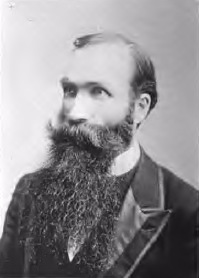 DUBBERT, Bernhard, director of the
conservatory of music in Upper Iowa university, at
Fayette, la., is one of the finest musicians in the
northwest, and has spent the greater part of his life in
studying the art he so much
loves. DUBBERT, Bernhard, director of the
conservatory of music in Upper Iowa university, at
Fayette, la., is one of the finest musicians in the
northwest, and has spent the greater part of his life in
studying the art he so much
loves.
He is a German, and inherits
much of his talent from his father, August Dubbert, who
was a skilled musician, and played the pipe organ in the
Evangelical church of his native village for many years.
He was also a public school teacher of no ordinary
ability, and taught for over fifty years, forty-eight of
which were spent in the town of Sonneborn, Germany,
where he died December 9, 1893. He was born January 24,
1824, in Elbrinxson. Professor
Dubbert's mother, Christine Wieneke, was born in the
village of Sonneborn, January 17, 1820, and died there
June 12, 1889. She was an intelligent, cultivated woman,
and took an active part in the education of her five
sons, all of whom grew up to be useful, public spirited
men.
Prof. Bernhard Dubbert is the
youngest of these five sons, and was born December
19,1861, in Sonneborn, the little town where his parents
spent most of their lives. This village is situated in
northern Germany, in the little principality of Lippe
Detmold, which is a part of the province of Westphalia,
or as the Germans call it, Westfahlen. Here, at the foot
of the mountains known as the Teutoburger Wald, and near
the banks of the beautiful Wesser river, he attended the
school taught so well by his father; and until he was 15
years old he had no other instructor. While very young
he exhibited a marked degree of ability in
music.
Under his father's
enthusiastic supervision, young Bernhard rapidly
progressed in music, as well as in his other studies. In
1877, at the age of 16, he came to America, where a
brother and cousin had preceded him in 1871. For several
years he worked on a farm in Grant county, Wis.,
improving what few opportunities he had to attend
school. During this period, his love for music never
grew less intense, and many a spare moment was spent in
practice and study. In 1884 he left the farm and for two
years gave lessons on the piano and organ at Fennimore,
a town in the county where he had been working.
He came to Iowa, in 1886,
locating at Laurens, Pocahontas county, near where his
brother had purchased a half section of land. Here he
continued as a music teacher with the greatest success,
and also dealt extensively in musical instruments. He
gained a high reputation as one of the most thorough
instructors and musicians in northwestern Iowa, where he
was widely known. He spared no time nor opportunity to
make visits to Chicago for further study and bearing
some of the greatest musical works performed, and also
such leading pianists of the world as Dr. Hans Van
Bulow, I.
Paderewski, Eugene D'Albert and others. In short, the
subject of this sketch is termed a musical enthusiast.
In December, 1894, he was offered a position as director
of the conservatory of music at Upper Iowa university at
Fayette, which he accepted and has since remained there.
By faithful, conscientious, enthusiastic work, he has
not only won the admiration of those about him, but has
succeeded in building up the musical department and
creating such an interest in it that the attendance is
now nearly twice what it was before he came to
Fayette.
Professor Dubbert was married
August 18, 1893, to Miss Minnie E. West, of Lake Park,
Iowa, whom he met as a teacher in Sutherland, O'Brien
county. She, too, is a musician, and has a voice of rare
sweetness.
She was a pupil of the professor's for some time
previous to their marriage. They have two children, Ruth
Christine, who was born at Laurens, June 15, 1894, and a
little son, Rudolph August, born September 13, 1897, at
Fayette, Iowa.
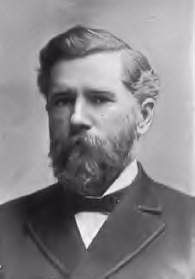 FULLER, William E., of West Union, former
member of congress from the Fourth District of Iowa, is
a descendant of the Fullers who were original members of
the Plymouth colony that landed from the Mayflower in
1620. Dr. Samuel Fuller was a deacon and physician to
the colony.
Dr. Levi Fuller, father of William E., has been a
leading citizen of Iowa since 1853. His father,
Elijah Fuller, was born and lived in Surrey, N. H., and
his mother, Matilda Newcomb, was born in Massachusetts.
The Fullers were soldiers in the revolutionary war and
one of them was shot at the battle of Bennington.
Dr. Fuller
has been identified with all the leading events in
Fayette county for more than forty years, and has given
generously of his means for the building of railroads,
churches, universities and other public institutions. He
is now president of the board of trustees of the Upper
Iowa university at Fayette, and is also president of the
board of education in West Union. Since coming to
Iowa he has been mostly in the real estate, banking and
brokerage business. He was commissioned as a surgeon in
an Iowa regiment by Governor Kirkwood, but before
entering the field was appointed United States revenue
col-lector for the Third District of Iowa, by President
Lincoln, and accepted that office. He was a member of the Iowa legislature and has
done his full share in developing the state. FULLER, William E., of West Union, former
member of congress from the Fourth District of Iowa, is
a descendant of the Fullers who were original members of
the Plymouth colony that landed from the Mayflower in
1620. Dr. Samuel Fuller was a deacon and physician to
the colony.
Dr. Levi Fuller, father of William E., has been a
leading citizen of Iowa since 1853. His father,
Elijah Fuller, was born and lived in Surrey, N. H., and
his mother, Matilda Newcomb, was born in Massachusetts.
The Fullers were soldiers in the revolutionary war and
one of them was shot at the battle of Bennington.
Dr. Fuller
has been identified with all the leading events in
Fayette county for more than forty years, and has given
generously of his means for the building of railroads,
churches, universities and other public institutions. He
is now president of the board of trustees of the Upper
Iowa university at Fayette, and is also president of the
board of education in West Union. Since coming to
Iowa he has been mostly in the real estate, banking and
brokerage business. He was commissioned as a surgeon in
an Iowa regiment by Governor Kirkwood, but before
entering the field was appointed United States revenue
col-lector for the Third District of Iowa, by President
Lincoln, and accepted that office. He was a member of the Iowa legislature and has
done his full share in developing the state.
William E. Fuller, the only
son of Dr.
Levi and J. E. Tipton Fuller, was born in Center
county, Pa., March 30, 1846. After a brief residence in
Stephenson county, 111., the family came to West Union
in April, 1853. The son received his literary education
in the Upper Iowa university and in the State
university. He held a position in the interior
department at Washington, resigning in 1867, and in 1869
entered the law department of the State university,
where he graduated with honors as the valedictorian, in
June, 1870. He immediately commenced the practice of his
profession in West Union, continuing it with marked
success up to the present time.
Mr. Fuller has been
interested in politics from his earliest manhood, always
identified with the republican party. He has been
chairman of the county committee, member of the district
and state committee, and in 1875 was elected to the
Sixteenth General Assembly, where he was an active
member of the judiciary committee. He declined a
re-nomination. In 1884 he was elected to the Forty-ninth
Congress in a district which had been carried at
previous elections by the democrats by more than 700
majority. The district was regarded as a forlorn hope
from the republican standpoint, but energy and
organization, which included fifty speeches by Mr.
Fuller, overcame the odds and the democratic candidate,
L. H. Weller, was defeated by 241 majority. Mr. Fuller
was an industrious and influential member of congress,
being a member of the committee on coinage, weights and
measures and committee on the revision of the laws,
taking an active part in the consideration of the silver
question. He was re-elected to congress in 1886 by 1,931
majority, and served on the judiciary committee. He
favored free lumber and free sugar in the tariff
discussion and made several speeches on the Fitz John
Porter, silver, lumber, sugar, interstate commerce and
pension bills, and the Nicaragua Canal bill. The
laboring people of the country were especially pleased,
and commended Mr. Fuller for his watchful care of their
interests.
He was also attentive to the business of old
soldiers at the national capital. Mr. Fuller remained in
Washington during the long session of the Fiftieth
Congress, the longest in the history of the country, and
declined to return to Iowa and canvass for a third
term.
Mr. Fuller is in constant
demand as a speaker and is often called upon to deliver
Fourth of July speeches and to speak on Memorial day and
at county fairs. Since his retirement from congress he
devotes himself to his professional duties, but has
often given his services to his party, on the stump. In
1897 Mr. Fuller's borne friends presented his name to
the republican state convention as a candidate for
governor. There were nine candidates and the contest was
a spirited one. Mr. Fuller's
candidacy was well received and he had the solid support
of his congressional district, which, considering that
his name was proposed but a few days before the
convention, was very creditable. The favorable
impression he made then is likely to be to his advantage
in the future.
Mr. Fuller was married in
Kossuth, Des Moines county, Iowa, January 1, 1868, to
Miss Lou J. Harper, the only child of William and
Harriet (Heizer) Harper. She is a native of Des Moines
county and was educated in the State university. Her
parents were among the early settlers of Des Moines
county, where her father has been a prominent resident
since 1842, and was a member of the legislature in 1850
and again in 1870. He is now, at the age of 80 years,
still active in business and is president of the State
bank of Mediapolis. Mr. and Mrs.
Fuller have been blessed with a family of nine children,
of whom seven are now living, four sons and three
daughters. Levi Harper was born December 10, 1868, and
is a practicing lawyer in Chicago; he is married and has
two children; Harriet May, born May 23, 1871, is married
to C. W. Holbrook, a lawyer in Cedar Rapids; Stella,
born February 2, 1875, married Rev. M. P. McClure,
pastor of the Presbyterian church in Kilbourn City,
Wis.; Clara Augusta, born March 6, 1877; William W.,
born January 28, 1880; Howard T., born September 13,
1884, and Robert E., born December 6, 1888, reside with
their parents in West Union. Mr. and Mrs. Fuller
are members of the Methodist church and the older
children are all identified with some one of the
evangelical churches. Mr. Fuller is deeply interested in
educational affairs, serving on the board of education
in West Union for a number of years and also being
identified with the management of the Upper Iowa
university.
He is also a practical farmer and has two fine
farms near West Union. His home farm of 370 acres
adjoins the town of West Union and is well
stocked.
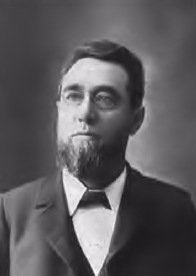 HOBSON,
Alfred Norman. In a study of the
lives and character of the men who have been chosen to
administer the laws of Iowa, it is pleasant to note the
recognition of the younger men at the bar. It is
gratifying to find instances where such recognition is
based on solid merit combined with modest demeanor, as
in the case of Hon A. N. Hobson, of West Union. Judge
Hobson is a native of the state of Pennsylvania born in
Allegheny City. His father, Hon. Joseph Hobson, moved to
Iowa with his family in 1855, settling at Fayette, where
he entered upon the practice of law. In 1858 he was
elected county clerk and moved his family to West Union.
After five continuous terms as clerk, he was elected to
a seat in the house of the Thirteenth General Assembly,
serving with ability during his term. At the close of it
he was appointed assessor of internal revenue, in which
position he served until the office was abolished. Mr.
Hobson was a man of great force of character and enjoyed
the respect and confidence of all who knew him. His wife
was Miss Elizabeth Baker, who was an ideal wife and
mother, presiding over the home with dignity and
tenderness, giving the best of care and counsel to her
children. HOBSON,
Alfred Norman. In a study of the
lives and character of the men who have been chosen to
administer the laws of Iowa, it is pleasant to note the
recognition of the younger men at the bar. It is
gratifying to find instances where such recognition is
based on solid merit combined with modest demeanor, as
in the case of Hon A. N. Hobson, of West Union. Judge
Hobson is a native of the state of Pennsylvania born in
Allegheny City. His father, Hon. Joseph Hobson, moved to
Iowa with his family in 1855, settling at Fayette, where
he entered upon the practice of law. In 1858 he was
elected county clerk and moved his family to West Union.
After five continuous terms as clerk, he was elected to
a seat in the house of the Thirteenth General Assembly,
serving with ability during his term. At the close of it
he was appointed assessor of internal revenue, in which
position he served until the office was abolished. Mr.
Hobson was a man of great force of character and enjoyed
the respect and confidence of all who knew him. His wife
was Miss Elizabeth Baker, who was an ideal wife and
mother, presiding over the home with dignity and
tenderness, giving the best of care and counsel to her
children.
It was under the influence of
such a home that Alfred N. Hobson grew to
manhood. In boyhood he attended the public schools of
the village, afterwards the Upper Iowa university, and
later at the State university. He chose law as his
profession, and entered upon the study under the
direction of his father and later in the office of Hon.
L. L. Ainsworth.
He spent three years in Dubuque in the office of
the United States assessor of internal revenue, gaining
a knowledge of the business and a wide acquaintance
among the prominent men of Iowa. In 1875 he became
associated with Hon. L. L. Ainsworth in the practice of
law, which was continued for twenty years, until Mr.
Hobson was called to the bench at the beginning of 1895.
During this time he devoted his energies to acquiring a
thorough practical knowledge of the profession, and won
recognition at the bar of the district as a chancery
lawyer, unsurpassed in northern Iowa. In 1894 there was
a spontaneous movement in the district to elevate him to
the bench, and the republicans tendered him the
nomination, which he
accepted.
He was elected and entered
upon the duties of the position, for which he was
eminently qualified. As a judge, he has been remarkably
successful, not only in earning the esteem of the bar
and litigants, but in the care and caution exercised in
ruling on points of law, in his methods of expediting
business in the court room, and in rendering decisions
that have been affirmed in the higher judicial
tribunals. His judicial district consists of the
counties of Allamakee, Clayton, Winneshiek, Fayette,
Howard and Chickasaw. Judge Hobson was re-nominated by
acclamation for a second term, and elected practically
without opposition.
In 1878 Judge Hobson was married to
Miss Mattie Kincaid Ingham, daughter of John B. and
Catherine (Neeb) Ingham, of Allegheny City. Pa. They
have three children: Joseph I, Ida N., and Florence L.
Mrs. Hobson is a lady of intelligence and refinement,
and while devoted to her domestic duties, is imbued with
the public spirit of the modern woman, and is active in
club work, and a favorite in social circles of the
community in which they are loved and
esteemed.
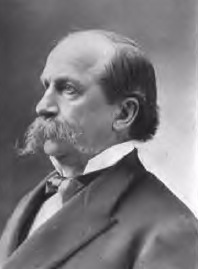 LARRABEE, William, chairman of the state
board of control of state institutions, twice governor
of Iowa, and for eighteen years a member of the state
senate, has carved an everlasting success out of the raw
materials offered by the state he chose to work
in. LARRABEE, William, chairman of the state
board of control of state institutions, twice governor
of Iowa, and for eighteen years a member of the state
senate, has carved an everlasting success out of the raw
materials offered by the state he chose to work
in.
He was the son of Capt. Adam
A. Larrabee, a noted Connecticut soldier and farmer, who
graduated from the United States Military academy at
West Point in 1811, and served with distinction in the
war of 1812. In the campaign of the St. Lawrence river,
he took part in the attack on La Colle Mills, as a
first-lieutenant of artillery, and was shot through the
lungs, the bullet being taken from its lodgment place
against his shoulder blade. That historic piece of lead
may now be seen in the state historical department at
Des Moines, where it is preserved as a relic. For his
heroic conduct in this battle, Lieutenant Larrabee was
shortly promoted to be captain, but resigned in 1815 and
two years later was married to Hannah Gallup Lester, by
whom he had nine children. William, the seventh child,
was born January 20,1832 in Ledyard, Conn. Captain Larrabee
was born March 14, 1787, and died October 25, 1869. His
wife was born June 8, 1798, and died March 15, 1837. Her
father, Nathan Lester, was a revolutionary hero, who was
born July 25, 1742, and died October 10,1813. His
wife
Governor Larrabee's grandmother, lived until
August 16, 1840. Captain Larrabee's father was also a
revolutionary soldier and after the war was a lawyer;
After he was discharged from the army, Captain Larrabee
returned to farming and was engaged in business. He
accumulated a comfortable fortune and was prominent in
politics, serving as a member of the legislature,
railway commissioner for the state of Connecticut,
presidential elector for William Henry Harrison in 1840,
and in other positions of
trust.
William Larrabee, having
received a common school education in Connecticut, and
spending two months in a private academy, receiving the
elements of a business training from his father, came to
Iowa in 1853. He taught school in Hardin, Allamakee
county, for a time and then worked on a farm for three
years. In 1856 he went into the milling business in
Clermont and continued until 1873, when he sold his
milling interests and spent three months in Europe. This
was his first real vacation. During his younger years
Mr.
Larrabee worked early and late, often putting in
twenty hours a day for months at a time. That was the
way he achieved success, and it is the recipe he gives
to young men who would succeed-work, work, work. He
devoted himself with all his might of body and mind-and
both were strong and healthy-to the accomplishment of
the business in hand, whatever it might be, and he has
followed this rule through life, in his public life no
less than in his private business.
Mr. Larrabee engaged in
banking and farming and has continued in the enlargement
of his interests in Iowa banks and Iowa farms since that
time. He owns bank stock in several banks in the
northern part of the state and is probably the owner of
more land than any other man in the state. He regards
Iowa farms as about the best and surest way to invest
money to secure reasonable and certain
dividends.
Mr. Larrabee was appointed,
with Senator Doolittle, of Wisconsin, and ex-Governor
Dillingham, of Connecticut, to be one of the arbitrators
to appraise the property of the Green Bay and
Mississippi Canal company, preparatory to its transfer
to the United States government. The property was taken
by the government on the appraisement of this
board.
In 1868 Mr. Larrabee was
elected to the state senate and was four times
thereafter re-nominated by acclamation, without
opposition, and re-elected in a district which began to
send democrats in his place as soon as he retired.
During his long service in the senate, he was chairman
of the committee on ways and means most of the time.
Here he had the widest opportunity for the exercise of
his extraordinary business talents, and was enabled to
be of great service to the state. He impressed his views
upon the legislation of the state, especially in this
line, for a longer period than any other man in the
state. In the fall of 1885, Senator Larrabee resigned to
accept the republican nomination for governor of Iowa.
He was elected, receiving 175,504 votes against 168,502
for Charles C. Whiting, democratic and fusion
nominee.
Two years later he was re-elected, receiving,
169,686 votes against 153,526 for T. J. Anderson, the
democratic and fusion nominee. Governor Larrabee's
administration was a highly successful one. Being
thoroughly informed about state affairs, he knew what
was needed, and he gave to the supervision of the state
institutions the closest personal attention. He
ascertained by personal investigation just what they
were doing, and inaugurated many reforms. The governor
exercised a large influence in politics in the state for
a long term of years and is yet counted as one of the
potent factors of Iowa republicanism. He began to vote
the republican ticket in 1856, when John C. Fremont was
the first presidential nominee of the party, and has
voted for every republican presidential
nominee.
In all of his success, his
wife has borne a share, and often a large one. She was
Miss Ann M. Appelman, and they were married September
12, 1861, in Clermont She is almost as well known in the
state as is her husband, for her ability to meet all
demands, to grasp large affairs, to share in her
husband's responsibilities, and withal, to make an
attractive, wholesome home, have won for her friends and
admirers in the people of Iowa. They have had seven
children, all living but one. They are: Charles, born
June 13, 1862, now in Armstrong, Iowa, looking after his
father's lands; Augusta, born May 21, 1864, married
August 20, 1896, to Victor B. Dolliver, and died in
Minneapolis March 14, 1897; Julia, born January 3, 1867,
married August 18, 1891, to Don L. Love, and lives in
Lincoln, Neb.; Anna, born March 9, 1869, who lives at
home: William, Jr., born December 11, 1870, who
graduated from the collegiate and law departments of the
State University of Iowa and served as captain and
commissary during the Spanish-American war, having
volunteered as a private and afterward been promoted;
Frederick, born November 3, 1873, now in Columbia Law
school, New York city, and a graduate of the collegiate
and law department of the State University of Iowa, and
Helen, born November 30, 1876, now a student in the
State university.
The Larrabees have a delightful
home in the edge of Clermont, where their friends are
always welcome.
The governor does not belong to any church, but
be has been a trustee of the local Presbyterian church
for thirty years, and has supported that and the
Methodist church. Mrs. Larrabee is, and has been for
many years, the superintendent of the Union Sunday
school in Clermont, and the family gave the church a
fine pipe organ.
When the legislature passed the board of control
law in 1898,.it was admitted, even by its friends, that
its success depended very largely upon the character of
men appointed to the board. Governor Larrabee was by
common consent selected as the best man for chairman of
the board, if he would consent to serve, which he
finally did, upon the urgent solicitation of Governor
Shaw. This work is most congenial to him and he has
again found an opportunity to be of great service to the
state. The
new law, under the administration of Governor Larrabee
and his two able associates, Judge Kinne and John
Cownie, is working with excellent satisfaction and
beneficent results.
The information
on Trails to the Past © Copyright may be used in personal family history research, with source citation. The pages in entirety may not be duplicated for publication in any fashion without the permission of the owner. Commercial use of any material on this site is not permitted. Please respect the wishes of those who have contributed their time and efforts to make this free site possible.~Thank you! |